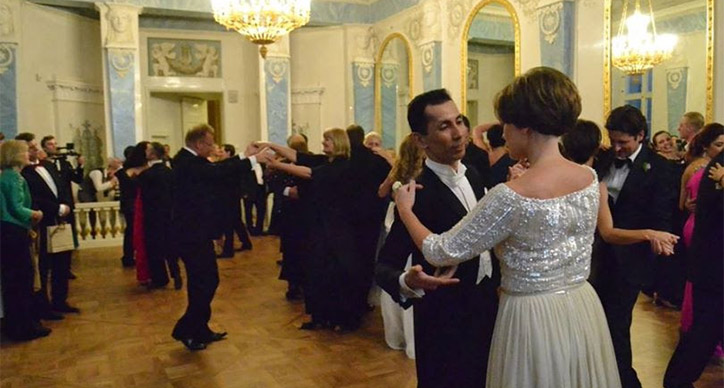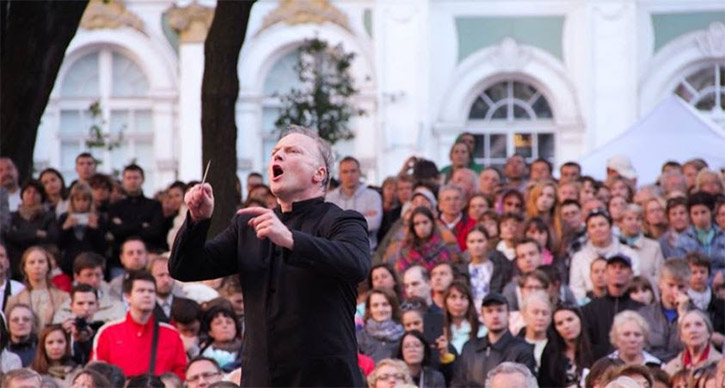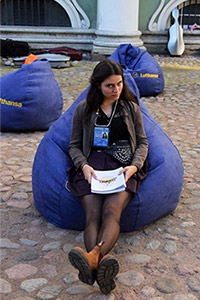Student Spotlight: Dispatch from Russia: The Real Interns of the Hermitage State Museum
Editor’s note: Polina Fradkin is a student at the University of Michigan and part of our UMS student intern team. This summer, Polina traveled to Russia for an internship with the Hermitage State Museum. Her travel blog follows, and her experiences include meeting maestro Gianandrea Noseda, the conductor of the Royal Theatre of Turin (which will perform the opera William Tell at UMS this December).

Photo: Moment from the White Nights Gala at the Hermitage. Photo by Polina Fradkin.
Right on Kazanskaya, left on Nevskiy, and through the arch into Dvortsovaya Ploschad’ — there it is, the Winter Palace in all its glory. I think I was so astounded when walking toward it every day that I took a photo … every day.
Some days, there was no work to do in the office, so I wandered the museum halls for hours, at times spending as long as twenty minutes in front of one painting. Some days, I worked for fifteen hours straight, through Gala evenings, European art biennial openings, and operas in the courtyard.
Once, I became best friends with maestro Gianandrea Noseda, the conductor of the Royal Theatre of Turin (which will perform the opera William Tell at UMS this December), and once I had to call an ambulance at two in the morning. A guest at an event had drunkenly cracked his skull in the courtyard. As I compressed the wound, I thought about writing “medical skills” under “museum internship” in my resume.

Photo: Maestro Gianandrea Noseda, the conductor of the Royal Theatre of Turin, performs outside of the Hermitage. Photo by Polina Fradkin.
Occasionally I picked up international guests from the airport, and a few times per week, I translated texts from English to Russian and vice versa for the Archaeological department. On Tuesdays, Wednesdays and Thursdays, my friend Emma and I ventured to the Storage and Restoration Facility of the Hermitage and taught English to the restorers. They fattened us up with tea and cookies, and it was a marvelous time, though I think they taught me more Russian than I taught them English.
The most mundane task of all, however, was standing at the entrance and catching people in coats or with backpacks, turning them around, and pointing them to the “garderobe” (that is, coat check). One of my most memorable experiences occurred at these entrance doors, when a certain Russian ex-pat and her American husband tried to push past us with their backpack (inside which might have fit a full grown gorilla), something for which I would have been reprimanded.
“Excuse me,” I said in Russian as I called their attention. “I’m afraid that that backpack will have to be checked.” The woman glared at me. “We were just here last week and they let us through… with the backpack,” she spat back in English. “I’m sorry, it’s protocol,” I responded. Next thing I knew, she had grabbed her husband by the arm and bulldozed through the doors. “Oh no she DI-IN’T,” I thought (or maybe even said it aloud?) as I dove inside and dragged them out by their jackets, using both hands and all of my crowd-parting might. As they finally made their way to check the godforsaken backpack, a relevant quote drew up in my mind, from Pushkin’s Exegi Monumentum: “Never argue with a fool.”
I left St. Petersburg almost penniless, but in my life, I had never felt so rich. Living in Russia sure isn’t easy. Your hummus standards drop drastically and your landlady is probably the worst person to walk the earth. Living these does, however, becomes bearable when one gets as lucky as I was and meets the best people in the world. My family, friends, roommates, co-workers, chefs, kasha addicts, kasha haters, movie watchers, and wine drinkers, French teachers, Shabbat dinner guests, Shabbat dinner hosts, brilliant Laundromat ladies, expert grocery shoppers, art savants, palace enthusiasts, opera goers, two AM bridge-parting watchers, salsa swing and waltz dancers, ogre-like but secretly wonderful flower shop owners, “let’s only speak Russian during dinner every night” attempt-ers, “Polina take the phone I can’t understand the landlady”-ers, and everyone who ever wandered into my home for the past summer, with or without warning. I miss them all terribly.
I miss falling asleep to the familiar clip-clopping of horse hooves down the street. I miss the thrill of exploring my new city. I miss living in a Tolstoy novel. I miss recognizing street names from Gogol and Pushkin tales. I miss Russia, and specifically, St. Petersburg, the place where I learned that losing hot water for weeks at a time doesn’t stop the population from going to the opera, the ballet, the museum. I needn’t have been surprised. After all, what force could interrupt the muse’s reign in Russia’s cultural capital?
Excerpt from “Exegi Monumentum”
by Alexander Pushkin
I’ve raised a monument not made by human hands.
The public path to it cannot be overgrown.
With insubmissive head far loftier it stands
Than Alexander’s columned stone.
No, I shall not die. My soul in hallowed berth
Of art shall brave decay and from my dust take wing,
And I shall be renowned whilst on this mortal earth
Even one poet lives to sing.
Interested in more? Check out other student guest blogs.






